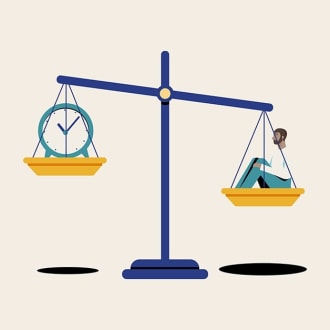
The Best Articles in Future of Work
The most useful articles and videos in Future of Work from around the web, curated by thought leaders and our community.
Refind focuses on timeless pieces and updates the list whenever new, must-read articles or videos are discovered.
Top 5 Future of Work Articles
At a glance: these are the articles that have been most read, shared, and saved in Future of Work by Refind users in 2024 so far.
Videos
Watch a video to get a quick overview.
Why Do Millions Of Men Not Want To Work?
Nicholas Eberstadt is a political economist, demographer, American Enterprise Institute scholar, and an author.More than 7 million prime working age men in A...
How AI Is Already Reshaping White-Collar Work
Artificial intelligence doesn’t just make fantastical images. For white-collar workers, generative AI like ChatGPT can make jobs easier by creating drafts of...
How to ...?
How to make a remote-first approach work
A Q&A with Quora CEO Adam D’Angelo about the tech company's detailed approach to becoming a remote-first organization.
Trending
These links are currently making the rounds in Future of Work on Refind.
The surprising connection between after-hours work and decreased productivity
Slack’s Workforce Index uncovers new findings on how to structure the workday to maximise employee productivity, well-being and satisfaction
Reduce, reuse, recycle: McDonald’s reusable workflows
McDonald’s reusable workflows — the continuous integration process with GitHub actions.
AI Losing Its Grip on Fast Food Drive-Thru Lanes
Artificial intelligence might not be the future of the drive-thru after all.
Short Articles
Short on time? Check out these useful short articles in Future of Work—all under 10 minutes.
The Importance of Play at Work
A Q&A with IDEO's Michelle Lee about about the importance of play at work, how to build design thinking into the employee experience, and how to optimize team-bonding efforts for maximum engagement.
What Happened When Zapier Cancelled Meetings for a Week? (Hint: Not Much)
Several readers pointed me toward a recent NPR Marketplace segement about a fully-remote tech company called Zapier that tried an interesting experiment last summer: they ... Read more
‘Can I just … rest?’: guilt, the four-day working week and what to do with the fifth…
As support for the four-day working week grows, we wrestle with the culture of achievement and busyness, and feelings of guilt and accountability
What Is Emotional Labor, and Why Does It Matter?
A new book explains how devaluing emotional labor—disproportionately done by women and other disadvantaged groups—perpetuates inequality.
Long Articles
These are some of the most-read long-form articles in Future of Work.
AI and the automation of work — Benedict Evans
ChatGPT and generative AI will change how we work, but how different is this to all the other waves of automation of the last 200 years? What does it mean for employment? Disruption? Coal consumption?
What Kant can teach us about work: on the problem with jobs
There is always a demand for more jobs. But what makes a job good? For that, Immanuel Kant has an answer
How to craft a harmonious life
Forget the ideal of work/life balance – your needs and interests are much richer than that, and your life can be too
A Way to Make Work More Meaningful (The Science of Happiness podcast)
We all overestimate how much we know. Our guest tries a practice in slowing down to ask more questions, and finds it leads to higher quality connections.
«Think about the scenario from the perspective of a person who disagrees with you. Try to imagine how they came to believe what they believe:»
Thought Leaders
We monitor hundreds of thought leaders, influencers, and newsletters in Future of Work, including:
What is Refind?
Every day Refind picks the most relevant links from around the web for you. Picking only a handful of links means focusing on what’s relevant and useful.
How does Refind curate?
It’s a mix of human and algorithmic curation, following a number of steps:
- We monitor 10k+ sources and 1k+ thought leaders on hundreds of topics—publications, blogs, news sites, newsletters, Substack, Medium, Twitter, etc.
- In addition, our users save links from around the web using our Save buttons and our extensions.
- Our algorithm processes 100k+ new links every day and uses external signals to find the most relevant ones, focusing on timeless pieces.
- Our community of active users gets the most relevant links every day, tailored to their interests. They provide feedback via implicit and explicit signals: open, read, listen, share, mark as read, read later, «More/less like this», etc.
- Our algorithm uses these internal signals to refine the selection.
- In addition, we have expert curators who manually curate niche topics.
The result: lists of the best and most useful articles on hundreds of topics.
How does Refind detect «timeless» pieces?
We focus on pieces with long shelf-lives—not news. We determine «timelessness» via a number of metrics, for example, the consumption pattern of links over time.
How many sources does Refind monitor?
We monitor 10k+ content sources on hundreds of topics—publications, blogs, news sites, newsletters, Substack, Medium, Twitter, etc.
Who are the thought leaders in Future of Work?
We follow dozens of thought leaders in Future of Work, including Benedict Evans, Christoph Magnussen, Harvard Business Review, MIT Sloan Management Review, General Assembly.
Missing a thought leader? Submit them here
Can I submit a link?
Indirectly, by using Refind and saving links from outside (e.g., via our extensions).
How can I report a problem?
When you’re logged-in, you can flag any link via the «More» (...) menu. You can also report problems via email to hello@refind.com
Who uses Refind?
450k+ smart people start their day with Refind. To learn something new. To get inspired. To move forward. Our apps have a 4.9/5 rating.
Is Refind free?
Yes, it’s free!
How can I sign up?
Head over to our homepage and sign up by email or with your Twitter or Google account.
Keep Learning
Learn something new, guided by experts. Deep Dives are carefully hand-curated series of time-tested articles and videos from around the web.
Get the big picture on your favorite topics.













